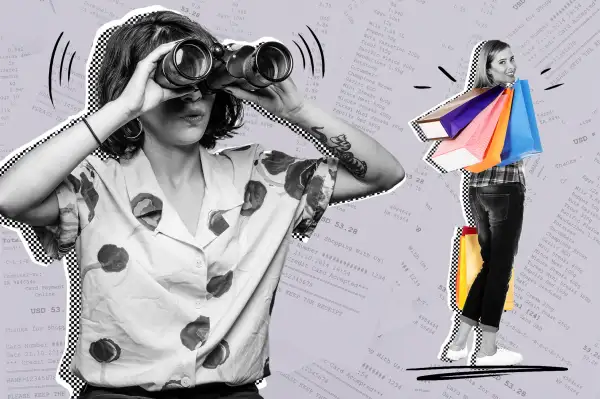Why Are We so Obsessed With How Other People Spend Their Money?

If you’ve ever found yourself in a Venmo news feed rabbit hole or checking (and rechecking) the Zillow price of every home for sale in your neighborhood — you’re not alone.
We’re all a bit curious about how other people spend their money, and with an abundance of apps and websites designed to help peek behind the curtain, it’s never been easier to indulge.
“With social media, the opportunity for the comparison complex is more frequent,” says Preston Cherry, a certified financial planner (CFP) and incoming president of the Financial Therapy Association. “It's at our fingertips every day and every second.”
This rings even truer these days thanks to payment apps like Venmo, and its controversial public feed that lets people see detailed payment information for any user that hasn't turned their settings to "private." Sites like Refinery29 have also piggybacked off our collective curiosities with user-submitted money diaries that chronicle every dollar a person spends over a set period of time. (The Refinery29 series has been so well-received since launching in 2016 that the site has since published an anthology of the most popular submissions.)
It's hard to tell whether this type of content was born out of demand, or if it just amplified it. Regardless, it could be changing the way people think about money, experts say.
Most people present idealized versions of their lives on social media, which makes it easy to get caught up in the idea that if you don't fit into a certain mold, you're doing something wrong. For users who are trying hard to design lives that fit a certain budget, or pick up the pieces of a difficult year marked by cutbacks, breaking out of that mentality can be especially difficult.
Megan McCoy, a financial therapist and secretary of the Financial Therapy Association, says that COVID-19 has made America's wealth divide even greater — in that some families have suffered devastating job losses while others bulked up their savings accounts due to a lack of travel and other leisure activities.
For those at the top of the curve, McCoy explains, that extra padding has made it easier to justify superfluous spending — on payment apps and otherwise.
On the plus side, the more comfortable people get with talking about money, and sharing intimate details about how they spend it, the less taboo the subject becomes.
Alicia McElhaney, founder of She Spends, a site that provides stories and tools to help get people out of debt, runs her own version of money diaries in a weekly email newsletter to readers. McCoy collects these diaries through a survey on her site, which she recently updated to “reveal the privilege and background of people's money stories" with new sections that ask people to list out their bills, including whether or not they split them with a partner or parent, as well as their investments and debts.
McElhaney has a front-row seat to the financial obstacles many people face. Most people, regardless of means, lament that they don’t feel like they’re doing enough when it comes to budgeting, saving and investing, she says.
“There are a lot of people who feel embarrassed by their financial situation,” McElhaney says. “I've seen people who make very little and people who make a lot of money share the same concerns and scripts like: ‘I'm not good with money’ and ‘I have no clue what I'm doing.’”
McCoy agrees.
“Many of us don’t think about how our values line up to our purchases,” McCoy says. “If we took the time to be mindful and ensure we are buying in accordance to our values then we’d all be happier.”
More from Money:
This Two-Minute Viral Video Proves It's Impossible to Time the Stock Market
Beyond Pride: Inside the Movement to Make Money More Inclusive of LGBTQ+ Americans